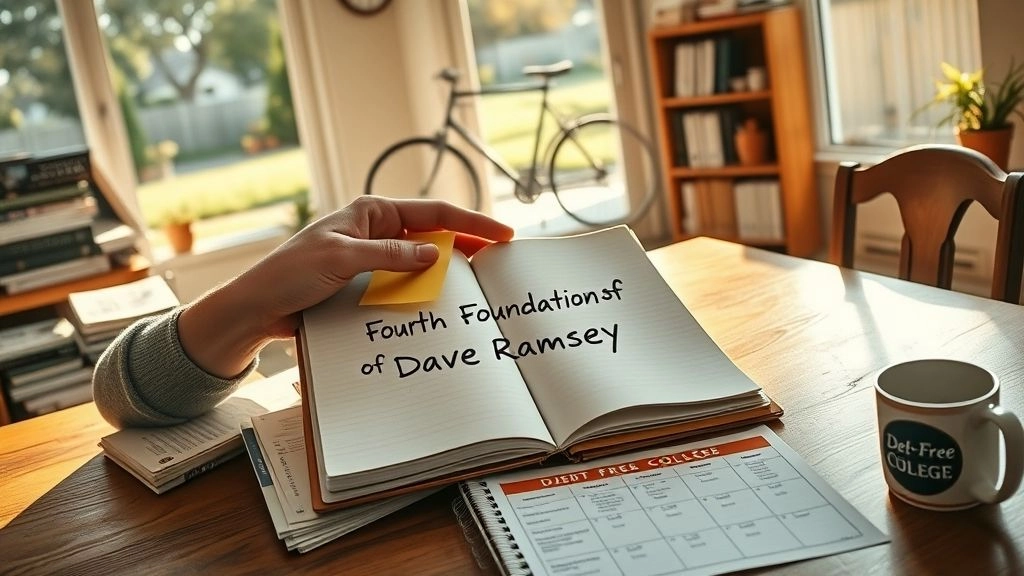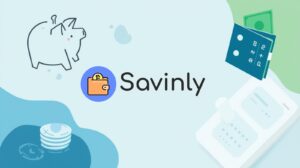Why Talk Frugality?
Did you know…the average college graduate today leaves school lugging around nearly $30,000 in student loan debt? Yikes, right? That’s like running the most important race of your life while dragging an anchor, especially if you’re just starting out or trying—really trying—to be smart with what you earn. If you’ve ever quietly panicked about how the heck you’re supposed to build a future, buy groceries, and somehow “enjoy life” on top of it all—you’re not alone. Not even a little.
Me? I used to stare at my bank balance and wonder if “budgeting” was just something grown-ups pretended to do. Enter: the five foundations from Dave Ramsey. They’re simple, practical, and truly shake up the way you think about money. And today, we’re going to zero in on something that gives a ton of people real hope: what is the fourth foundation of the dave ramsey course? (Spoiler: It’s how you fund college without the soul-crushing loans.)
Game-Changing Foundations
Starting Small: The First Steps
So here’s the deal. Before you even think about tackling college debt, the whole quest begins with saving—yep, plain old saving. I wish someone had inked that on my forehead at 17. The first foundation is simple but powerful: the first foundation is: save. Not sure where to start? Try tossing five bucks a week in a shoebox (or your savings account—less dusty). What matters is you start and keep going.
How Do You Actually Save?
Look, I’m not about to say, “Just stop buying lattes!” That’s tired. What turned things around for me was tracking every little purchase—yep, even gum. You’ll notice patterns, little leaks. Cut out one thing a week. Week one? Ditch Uber Eats. Week two? Cancel the streaming service you haven’t opened since Stranger Things ended. The trick is these small sacrifices add up—and you don’t feel deprived.
I still remember the first time I had $500 set aside. It felt like I’d just discovered a force field. If something broke (and, let’s be honest, something always breaks), I stopped freaking out. True story: I once survived a $300 car repair without begging my mom. Progress.
Busting Out of Debt
How Bad Is Debt… Really?
“Oh, it’s just a few credit card bills…” Yup. I thought that too. Until I made a late payment (life got busy!)—and wow. if you make a late credit payment, you might see the lender add some gnarly fees, and suddenly you’re paying way more than you borrowed. The second and third foundations? Living on less than you make… and avoiding debt like it’s the last five minutes before closing at the DMV.
Debt vs. Freedom: Quick Table
| Debt Trap | Frugal Fix |
|---|---|
| Using credit cards for “emergencies” | Build a starter emergency fund first (even $500 helps!) |
| Taking out loans for the latest phone or gadgets | Wait and save up—perspective: your future self will thank you |
My turning point? Realizing I was one small mishap away from being buried. It’s not about never having fun. It’s about not lying awake at 3 a.m. with money shame. And believe me, those late-night “what ifs” are brutal.
Want to go deeper? There’s a good little breakdown that helps redefine your relationship with debt—take a look at Dave ramsey Chapter 3, LESSON 1.
Back to Basics: Frugal Mindset
Have You Noticed How Quick Habits Add Up?
Have you ever noticed that “just one” little indulgence—fast food, the extra app subscription—turns into “it’s just $5, what’s the harm?” And suddenly, you’re out $100 for the month and you can’t even remember what for? This is where budgeting magic comes in. And no, I don’t use complicated spreadsheets either. I just… track. On paper. On my phone. Whatever works.
Remember, frugality isn’t being cheap. It’s being intentional. The goal? Freedom, not boredom.
The Power of Saying “No”
A story: My friend Sarah once spent $0 on eating out for an entire month. (She loves a challenge.) She shopped her pantry, got creative, and used the savings—get this—to pay off a nagging medical bill. She nearly cried with relief. That’s frugality in action: small, weird goals that snowball into “wow, I actually did it.”
Debt-Free College—the Missing Link
So… What Is the Fourth Foundation of the Dave Ramsey Course?
Okay, here’s where it gets good. All this budgeting, saving, and debt-dodging builds up to something massive: paying for college without student loans. This is the fourth foundation in Dave Ramsey’s approach (overview here). College debt-free. That’s… not what most of us are taught. We’re told to just accept loans as a part of life, right? But take a sharp left and you realize the finish line isn’t “adulthood with debt”—it’s freedom, options, and sanity.
Why does this matter? Well, when you skip the loans, you aren’t chained to monthly payments and stress for years after you graduate. You can actually save, take risks, or move cities if an opportunity pops up. You may even, wild thought, do work that lights you up—not just what pays the debt collectors.
Wait, Is It Actually Possible?
Absolutely. Look, nobody’s saying college is cheap or that scholarships fall from the sky. But millions do it—sometimes in ways that look (and feel) unconventional:
- Start at a community college, transfer later.
- Apply for every scholarship—even the weird ones (left-handed flute majors, I see you).
- Choose schools that want you (and offer aid).
- Work part-time. It sucks sometimes. But so does years of debt.
- Live at home a little longer—tough pride pill, big wallet win.
Here’s what Dave Ramsey himself says, boiled down: “Pay cash. If you can’t? Don’t go. Or, find a creative, debt-free way in.” It’s not glamorous. But it works. And it’s led to some wild success stories.
Curious How It Feels?
You know that dream where you’re the only one in class who didn’t do the homework? That’s how it felt when my cousin Sam finished college loan-free and moved cross-country with $2,000 in the bank… while all his friends were locked into payments that ate half their first real paycheck. He worked summers, lived at home, avoided the big-party school, and said “no” to stuff a lot. But now, when opportunities show up? He can say “yes” without panicking.
Plus, if you want to quiz yourself, there’s a fun Ramsey classroom chapter 3 post test that helps you visualize how these debt-free choices add up.
Real-World Hacks for Paying Less
Scholarships: Still a Thing?
Yes! Billions (…with a “B”!) go unclaimed every year. I’m serious. My neighbor’s kid won one just for writing about the family guinea pig. So start looking early, and don’t just shoot for academic awards—look for community service, weird hobbies, local businesses… anything.
Work and Save: The Unpopular Truth
I know, I know. You may not want to work while you’re in school (who does?). But working part-time—even a few shifts a week—doesn’t just help you pay tuition. It teaches hustle, time management, grit… all the life stuff. I waited tables through undergrad, and thanks to that, I learned to stretch $10 like a pro. (Also: You never forget bad tippers.)
Let’s not forget living at home a bit longer. Is it ideal? Not for everyone. But just think—$700 a month saved by crashing with your folks? That’s almost $8,500 a year you didn’t have before.
| Frugal College Life | Debt Trap College Life |
|---|---|
| Community college for 2 years Work-study, scholarships Live at home DIY meal prep | Four-year out-of-state school Loans for tuition AND pizza Classic “college experience” ($$$) Minimum wage side jobs can’t cover debt |
Taking the Next Steps (And Not Panicking)
So What About After College?
Honestly, living debt-free after school is like being handed a head start in life. You can build up an emergency fund again—or even start investing sooner (again, that’s foundation #5). And if you ever make a slip (miss a payment, get hit with a sneaky fee), don’t panic. Just course correct, and remember, if you make a late credit payment, you might see the lender add some serious costs. Try not to let that snowball.
If all this sounds overwhelming—relax for a sec. You can practice with the Ramsey classroom chapter 3 post test to self-check what sticks.
Not ready to start college yet or still working on that emergency fund? Check out the first foundation is: save when you need a pep talk. And hey, Dave ramsey Chapter 3, LESSON 1 gives more practical stories about dodging debt and building a real-life, not just a spreadsheet fantasy.
The Honest Wrap-Up
So: what is the fourth foundation of the dave ramsey course? It’s paying for college without racking up student loans. Simple? Not always. Possible? If you’re stubborn. Totally life-changing? Without a doubt. The real secret? All these little daily wins—skipped drive-thrus, side gigs, asking for help, hunting scholarships, saying “no”—they add up to something big. They add up to peace.
This is your nudge to start wherever you are. Make your savings habit as normal as brushing your teeth. Get weird with scholarships. Say “no” to debt, even when everyone else says it’s normal. Because normal is broke, and you? You’re aiming for something better.
So what step do you feel brave enough to try this week? Could you skip takeout, track expenses for a week, or have a real talk about money goals? I’m cheering you on. And if you need a boost or want to geek out over frugal wins, drop your thoughts below or explore more with the the first foundation is: save or Dave ramsey Chapter 3, LESSON 1. Here’s to your debt-free, possibility-packed future—one quirky, scrappy, determined dollar at a time.













